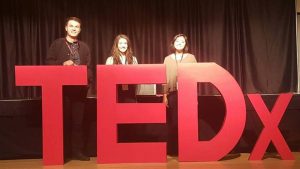
Attended by Basma Humadi (Fourth Estate), Igor Stojanov (OSM Media Fellow), and Jackie Reed (WGMU Radio). Photo Courtesy of Igor Stojanov.
By: Jackie Reed
After months of planning and collaboration, the re-scheduled TEDxGeorgeMasonU spring conference was hosted in Dewberry Hall on September 10. With great patience and organization, the board of members crafted a remarkable conference that embodied the idea of “Revival”, referring to both the event and the conversations enveloped within the afternoon meeting. Several students and faculty gazed their attentions to intimate presentations set forth by prolific speakers across Mason’s many disciplines. The underlying questions arose: What is revival, and how can we cultivate change in a proactive way?
Concepts ranged from topics in politics, education, technology, culture, and beyond. The afternoon kicked off with an introduction from co-directors Rohma Hassan and Aisha Shafi. Though the conference was postponed, their hiatus helped the TEDxGeorgeMasonU board members fixate on the “Revival” theme. Hassan and Shafi were elated to share that after months of coordination, they are prepared to reinstate the conference’s return in following years.
